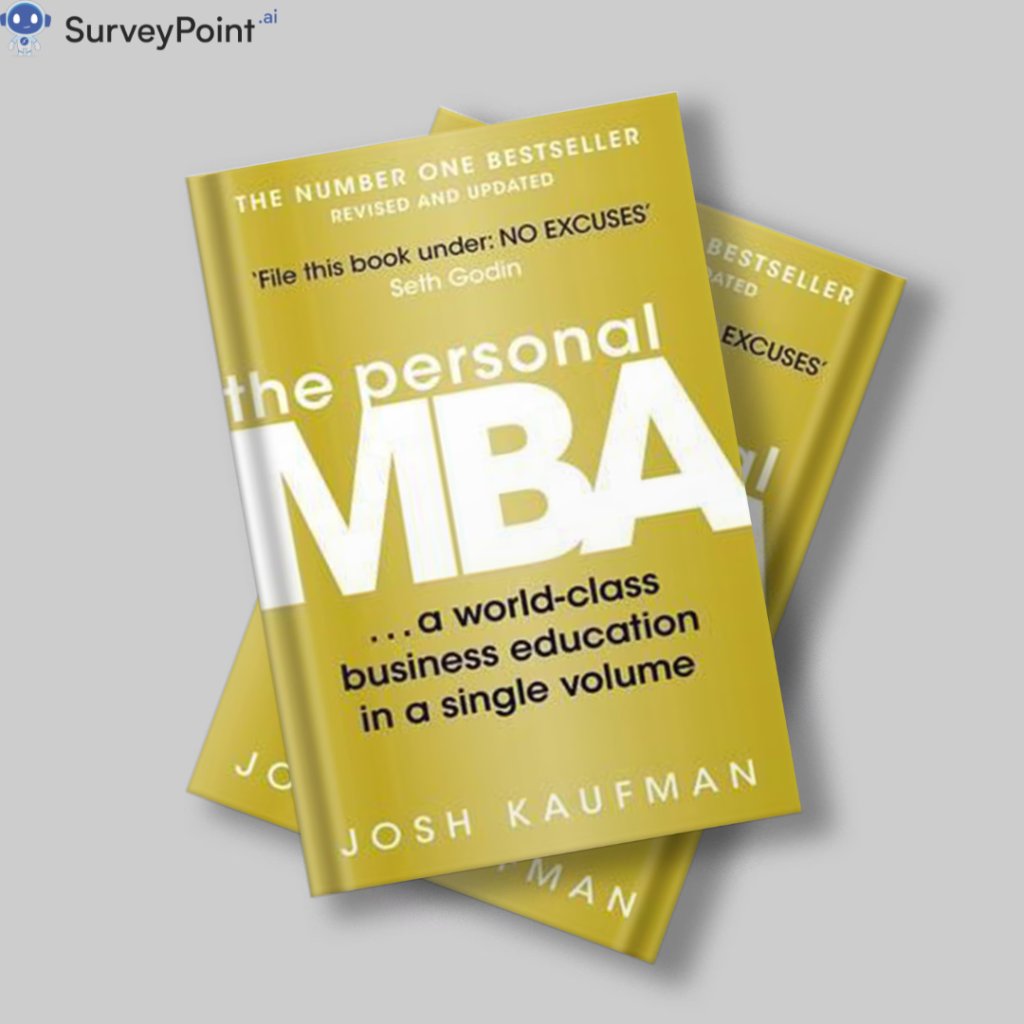
In a world where traditional business education is often expensive and time-consuming, Josh Kaufman’s The Personal MBA offers a refreshing, no-nonsense approach to mastering the fundamentals of business. Rather than committing to a costly MBA program, Kaufman encourages readers to self-educate and acquire core business skills independently. With practical insights on marketing, sales, finance, management, and more, The Personal MBA is a guide for anyone seeking to succeed in business without formal education. Here’s a breakdown of the key lessons and principles in the book.
1. Building a Strong Foundation: Learn the Essentials First
Kaufman argues that, at its core, business is about creating value for others. He believes that before diving into advanced strategies, you need a clear understanding of core business principles, including:
- Value Creation: Understanding your customers’ needs and creating solutions that satisfy those needs.
- Marketing: Making sure potential customers know you exist and can solve their problems.
- Sales: Converting interest into revenue.
- Value Delivery: Providing the value you promised efficiently.
- Finance: Ensuring you bring in more revenue than you spend.
These principles form the bedrock of every successful business, and Kaufman stresses that mastering them is more important than complex, theoretical concepts.
2. Marketing & Sales: Attracting and Engaging Customers
Kaufman devotes a significant portion of the book to marketing and sales, essential for any business’s growth. His advice focuses on understanding what customers truly want and tailoring your approach to meet their needs.
- Identify and Address Pain Points: Successful businesses solve real problems. Kaufman encourages business owners to ask, “What challenges are my customers facing?” and position their product as the solution.
- The “Mindspace” Model: This model suggests ways to capture customer attention by appealing to emotions, engaging with storytelling, and creating memorable experiences.
- The Power of the Pitch: Effective communication is key. Whether it’s an email or a presentation, every message should have a clear purpose and benefit for the customer.
In the book, Kaufman emphasizes that sales should be about building trust, not pushing products. When customers see genuine value in your offering, they’re more likely to engage and stay loyal.
3. Value Delivery: Ensuring Consistency and Quality
Delivering on your promises is essential to building a positive reputation and a loyal customer base. Kaufman emphasizes that operational efficiency and a smooth delivery process are critical to achieving this. He shares practical tips for ensuring that businesses deliver what they promise, including:
- Systems Thinking: Good systems make sure that every aspect of your business—from production to customer service—works harmoniously. Kaufman recommends mapping out processes to identify and address any bottlenecks.
- Efficient Operations: Cutting out unnecessary steps saves time and money. The Personal MBA encourages readers to simplify workflows and use resources effectively.
- Continuous Improvement: Kaufman advocates for a mindset of constant refinement. By regularly analyzing feedback and looking for ways to improve, businesses can adapt and grow.
In today’s fast-paced world, consistency and quality are what build trust and distinguish your brand from the competition.
4. Financial Literacy: Understanding Money Flow
Kaufman insists that business success depends on understanding your finances. He argues that financial literacy is crucial for making informed decisions and avoiding potential pitfalls. Key takeaways from his financial advice include:
- Revenue vs. Profit: It’s easy to get caught up in how much money you’re making, but what matters is how much you keep. Understanding the difference between revenue and profit helps ensure that a business is financially sustainable.
- Cash Flow is King: Cash flow measures your business’s ability to sustain itself. Kaufman suggests closely monitoring cash flow to ensure you always have enough liquidity to cover expenses and invest in growth.
- Risk Management: Every decision has a financial impact. Kaufman encourages business owners to weigh risks carefully and to avoid unnecessary debt or over-expansion.
A solid grasp of finances not only helps keep the business afloat but also sets the foundation for growth.
5. Productivity and Self-Management: Maximizing Efficiency
Beyond business skills, Kaufman also delves into personal productivity and self-management, as these are vital for any entrepreneur or business leader. Some of his productivity insights include:
- The “Five-Fold Why”: This technique helps identify the root cause of any issue. By asking “why” five times, you can dig deep to find and address underlying problems.
- Focus on High-Impact Tasks: Following the 80/20 rule, Kaufman suggests prioritizing tasks that yield the most results and minimizing or eliminating low-impact activities.
- Mindset Matters: He highlights the importance of a growth mindset, encouraging readers to embrace learning, resilience, and adaptability in the face of challenges.
In addition to focusing on high-impact tasks, Kaufman emphasizes the importance of work-life balance and maintaining health, as these factors contribute to sustained productivity and fulfillment.
6. Management & Leadership: Leading with Purpose
In the realm of leadership, Kaufman offers actionable advice for managers and aspiring leaders. His approach emphasizes purpose-driven leadership and clarity in communication.
- Empower, Don’t Micromanage: Good managers trust their team to do their jobs well. Kaufman believes empowering employees to take ownership fosters innovation and satisfaction.
- Provide Clear Expectations: Kaufman stresses the importance of setting clear objectives and goals, as well as giving regular feedback to keep teams aligned.
- Focus on Long-Term Goals: Great leaders look beyond short-term wins and focus on building a company culture that supports sustainable growth.
Through strong leadership, businesses can inspire employees, encourage creativity, and drive lasting success.
7. Lifelong Learning: The Power of Self-Education
The essence of The Personal MBA is self-education. Kaufman believes that the best learning doesn’t necessarily come from formal education but from a commitment to ongoing growth.
- Develop a Reading Habit: Kaufman recommends that anyone serious about business read widely on topics such as psychology, negotiation, and economics. Learning from diverse sources allows for a more holistic understanding.
- Embrace Experimentation: Kaufman encourages readers to treat business as an experiment where they learn from both successes and failures.
- Stay Curious: A willingness to learn and grow ensures that you remain adaptable and ready for any challenges the business world may throw at you.
Learning is not just for students; it’s a lifelong journey. Kaufman’s book provides a strong foundation, but he advocates that readers continue seeking knowledge and new insights.
Conclusion: A Practical Guide for Every Aspiring Entrepreneur
The Personal MBA is more than just a book on business—it’s a manual for succeeding through self-education and practical application. Josh Kaufman’s focus on the fundamentals, financial literacy, and self-management provides valuable insights that anyone can use, regardless of their level of experience.
For anyone seeking a flexible and cost-effective alternative to a traditional MBA, Kaufman’s approach offers a powerful blueprint for building business acumen and achieving long-term success. For more information checkout- surveypoint.ai




